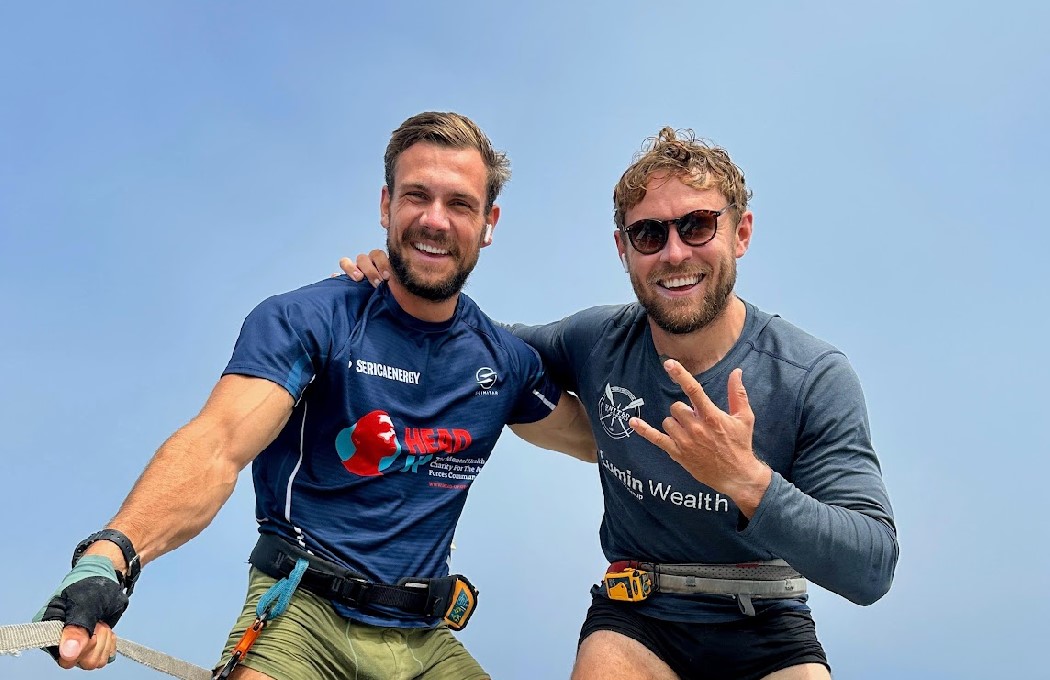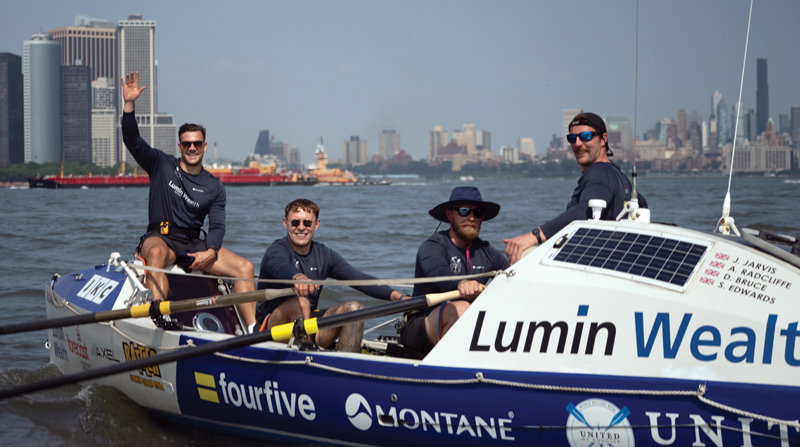Four rowers aimed to beat an ocean passage record yet instead smashed the fundraising goal while rowing in a shell that had been found in the Bahamas and patched for the passage.

The smaller the boat, the bigger the test.
It’s known among ocean voyagers that the key to success is the people you go with. The smaller the boat, the bigger the test. So, how about 3000 miles on a skinny, claustrophobic 24-footer with nothing for power but oars?
“If you’re not aligned, it’s a very small space,” said smiling Jack Jarvis. “With a good team you can do it. With the wrong one, it’s horrendous.”
Luckily, he chose well. On August 15, Jarvis and three mates completed a 56-day Atlantic crossing from the U.S. to Britain in a fiberglass cockleshell he found abandoned in the Bahamas and patched up for the passage.
It all started in Annapolis.
It all started in Annapolis, where the lads gathered in June in Jack’s aunt’s backyard with paint pots and tools to refurbish the battered hull. They were noisy but not unwelcome.
“He makes us so proud,” said the beaming aunt, Adele Oliver. “Just a joy to have—so warm, kind and funny, yet so driven and committed.”
The crew, strapping Englishmen with nowhere else to stay, slept in the basement and hammered away by day, slithering on their backs and bellies in mud and gravel to strip and paint the bottom, among other indignities.
They’re no strangers to privation. Jarvis, 31, recently left the Army as a Royal commando. David Bruce, 29, and Sam (Nutty) Edwards, 32, were Royal Marines, and Adam Radcliffe, 28, is an adventure sport coach. Fit and heroically tattooed, broad of shoulder and narrow of waist, they looked the part.
The goal was to beat the 43-day record for fastest rowing passage from New York to the UK and to raise money (105,000 British pounds, in the end) for the British military charity Head Up, through donations.
“Men used to go to war,” Jarvis mused. “Today we row across the ocean for Instagram clout.”

Three challenging days.
They left New York in fair winds and high spirits, but any shot at the record went by the boards on day eight, just 300 miles out, when they had to deploy a parachute anchor and hunker down in wild winds. They capsized, went backwards 20 miles, blew out key electronics, lost some gear, and got to know each other all too well, jammed for 36 hours in the eight- by 10-foot stern cabin they dubbed “Barbie’s Dream House.”
The first blasts knocked Jarvis and Radcliffe off the boat, but they were tethered and clambered back aboard. Then, it was into the sweaty Dream House till the storm eased. Any thought of quitting at that point with the record unattainable?
“Morale was low,” Jarvis conceded, “but we had no choice. We were going home. We would never quit.”
Back at it they went when the winds abated, three hours on, three off, rowing in pairs 24 hours a day, fueled by 7000 calories of freeze-dried gruel and desalinated ocean water from a solar-powered watermaker. Jarvis had been there before. He completed his first big passage in 2022, rowing solo for 111 days from Portugal to Florida, setting a record and raising 76,000 British pounds for brain cancer research.
Always happy and good-hearted.
If his daily Instagram posts, sent by Starlink, were any indication, he led this trip by example. Jarvis popped up day after day on screen, increasingly bearded and weary, but with a smile a mile wide and a silly riddle to challenge viewers. He hit his chirpiest in the Gulf Stream, when currents helped propel the boat 140 miles in 24 hours, an ocean rowing record. But the grin stayed put when foul winds and tides pushed them nowhere, too, or even backwards.
Aunt Adele reckons he acquired his upbeat demeanor growing up in a pub. Her sister Deborah and husband Matt took over the family business, the Victory Pub in Hamble, England, when Jack was just two years old.
“He was Matt’s little shadow, following him around, stocking bottles on the shelves. He’s always been that happy, good-hearted kid,” she said.
Despite the fact that Hamble is one of Britain’s yachting centers, young Jack wasn’t all that interested in boats. He didn’t take up rowing seriously until the Army, when he joined a competitive club and quickly rose to leading it. His first ocean passage was to raise money in honor of his granddad, John Stratton, the Victory Pub’s owner, who died of a brain tumor.
When the drama kicked in.
While no record was set this time, Jarvis more than doubled his initial fundraising goal of 50,000 pounds. Much of it rolled in during the late stages of the trip, when drama kicked in. First it was food. “We’re running out,” he reported with a few hundred miles to go. Well, not exactly. They were coming down to snacks and porridge, but why ruin a good tale with details?
Then, it was a looming storm and headwinds that would send them spinning backwards just a few miles from the finish at the Scilly Isles, which dangle alluringly off the bottom of Britain, its closest point to North America. That storm never materialized either. The boys made the finish in the black of night, at 2 a.m., with just the harbormaster and a few brave souls to greet them with shouts and horns.
They slept the sleep of the righteous weary that night on the cold floor of the harbormaster’s office. In the morning, they and the boat were trundled off to Hamble, where they restaged a finish for a proper crowd of hundreds, and everyone was wearing a smile.
“It was a bad day to be a beer,” crowed smiling Jack Jarvis. “Many were sunk.”
by Angus Phillips




